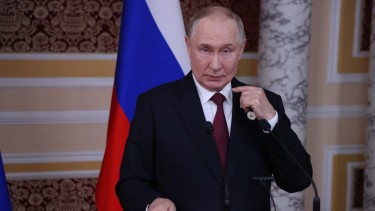Business
World reaches turning point - What should you invest in when everything is already expensive?
Ann-Katrin Petersen, Investment Strategist at Allianz Global Investors, will talk in more detail about her expectations regarding equity markets at Portfolio's Investment, Wealth and Savings (IWS) conference next Tuesday. Don't miss it!
Portfolio: It seems like inflation will never want to come back to the world. Has everything changed we thought about inflation until now? What does recent inflation environment mean from a monetary easing policy point of view?
Even though the economic upswing has also fed through to the labour market, declining unemployment rates have not yet resulted in significant wage inflation. Underlying inflation pressures - which do not stem from energy-price-related base effects or past currency moves - remain rather subdued. However, inflation is not dead and the Phillips curve still matters.
We expect inflation to incrementally pick up against a backdrop of ever tighter labor markets and rising economy-wide capacity utilization. As a result, major central banks will continue to head towards a gradual normalization of their ultra-loose policy, with the US Fed leading the way. In other words: Monetary policy will remain growth-supportive, but the dose of central bank stimulus is decreasing.
Last year Europe’s economy finally came in a good shape, the global economy as well. What do you expect from global economy growth in a medium term (3-5 years)?
Most advanced economies face medium-term growth rates considerably lower than in the decade before the global financial crisis. In advanced economies such as the US and euro area, aging workforces and sluggish productivity trends play a major role. Moreover, potential growth is held back by a public and private debt overhang in some countries. In China, in turn, the moderation in long-term growth is a natural result of the country’s rebalancing away from exports and investments towards services and consumption.
Europe’s optimism is shadowed by Italian economic (and recently political) uncertainties. What does Italy’s troublesome situation mean for the Euro?
The Italian economic recovery has gained traction in 2017, but structural weaknesses such as the mound of public debt, political instability and the related reform backlog continue to weigh on the medium-term economic outlook. It looks as if exploratory talks will turn out protracted given that no single party or electoral alliance was able to win an absolute majority of votes and the remaining theoretical options for a majority government seem to be politically difficult. Any coalition that emerges is likely to be somewhat less reformist and less focused on austerity.
Regarding the Eurozone, while the lack of political appetite for “more Europe" is a source of concern, any “Italexit" scenario has in our view never been likely given major political and legal hurdles. If euro-sceptic parties become part of the future government coalition, this political backdrop will like provide some headwind for French president Emmanuel Macron’s Eurozone reform agenda. In any case, we should expect moderate reforms in selected policy areas only, e.g. completion of the Banking Union, transformation of the ESM into a European Monetary Fund, rather than a quantum leap towards “doing much more together".
Let’s talk a little bit about stock markets. Do you expect stock market rally to go on or you expect the correction started in January to continue?
We keep a constructive view on global equities as the economic backdrop remains strong and solid corporate earnings growth should continue to support the stock markets. US companies, which make up about half of the global equity market, are benefiting from tax relief as well as the announced fiscal spending package.
However, we are entering a stage of the business cycle where the strong cyclical tailwinds for the equity markets will gradually abate.
In the ninth year of the economic upswing, signs of a peak in global growth momentum are increasing. In other words: Global growth rates might well stay above potential, propping up corporate profits, but a further acceleration in growth is unlikely. Positive data surprises - a typical tailwind for stock markets - have become less likely.Against this background, we will have to get used to stronger market volatility. For investors, this continues to be an environment where active fund managers may take advantage of the opportunities arising from heightened volatility.
We are heading towards volatile times. Which sectors, stock markets are worth investing in?
In the last quarters, the “goldilocks" expectations have been the key driver for the relative outperformance of cyclical sectors, especially those geared to higher interest rates, such as financials. While we stick to our expectation of higher bond yields mid-term, a topping out of global growth momentum, as indicated by the rollover of leading economic indicators, should increasingly weigh on cyclicals and favor a more defensive sector allocation. We still see value in financials, but have become more cautious for industrials.
What affect should have a trade war on stock markets? Which countries, which sectors could be the most affected?
Trade is a key pillar of global growth and has contributed on average one-third to the total global economic growth rate in the long run. That said, protectionist tendencies are certainly not a new phenomenon - the Doha round of multilateral trade negotiations, which was meant to liberalise global trade, has been in a vegetative state for years now.
Nevertheless, the risk of a protectionist downward spiral has increased and might ultimately deal a severe blow to the global upswing. This would hurt the earnings outlook and increase uncertainty, which stock markets don’t like. If a “trade war" really came to pass, typical “safe havens", such as the Japanese yen or the Swiss franc, would likely benefit. As a rule of thumb, an escalating trade conflict would pose a higher risk for Emerging Market than Developed Market stocks.
Sector-wise, more defensive stocks such as consumer staples would likely provide more shelter than cyclical ones.
Are stock markets expensive in your opinion? Do you see any signs of market overheat?Valuation - as measured by the price-to-earnings ratio - remains rich in global equities, and particularly in US equities, but less so than in early February. Most Emerging Market assets, on the other side, are on the cheap side. Going forward, the development of corporate earnings will be key. For the time being, solid corporate earnings growth continues to support stocks. In the medium term, we see two headwinds for valuation: Fading support from central bank liquidity provisions and a worsening mix of growth momentum, which might plateau or fade, and inflation, which looks set to rise.
Regarding your second question, market complacency has clearly been taken out to some extent, as, for instance, the spike in the volatility index VIX and the sell-off in Bitcoin are telling us. As a result of the less expansionary monetary policy stance, we expect market volatility to normalize structurally. The VIX will likely settle at around its long-term average levels of nearby 20 as opposed to persistently falling back to levels of about 10.
Ann-Katrin Petersen
Vice President, Investment Strategist, Global Economics & Strategy
Allianz Global Investors
Ann-Katrin Petersen is a Vice President with Allianz Global Investors, which she joined in 2014. In her current role as Investment Strategist at Global Economics & Strategy, Ann-Katrin is responsible for developing macroeconomic research... Click here fore more!»
Ann-Katrin Petersen, Investment Strategist at Allianz Global Investors, will talk in more detail about her expectations regarding equity markets at Portfolio's Investment, Wealth and Savings (IWS) conference next Tuesday. Don't miss it!
Front page photo by Shutterstock










